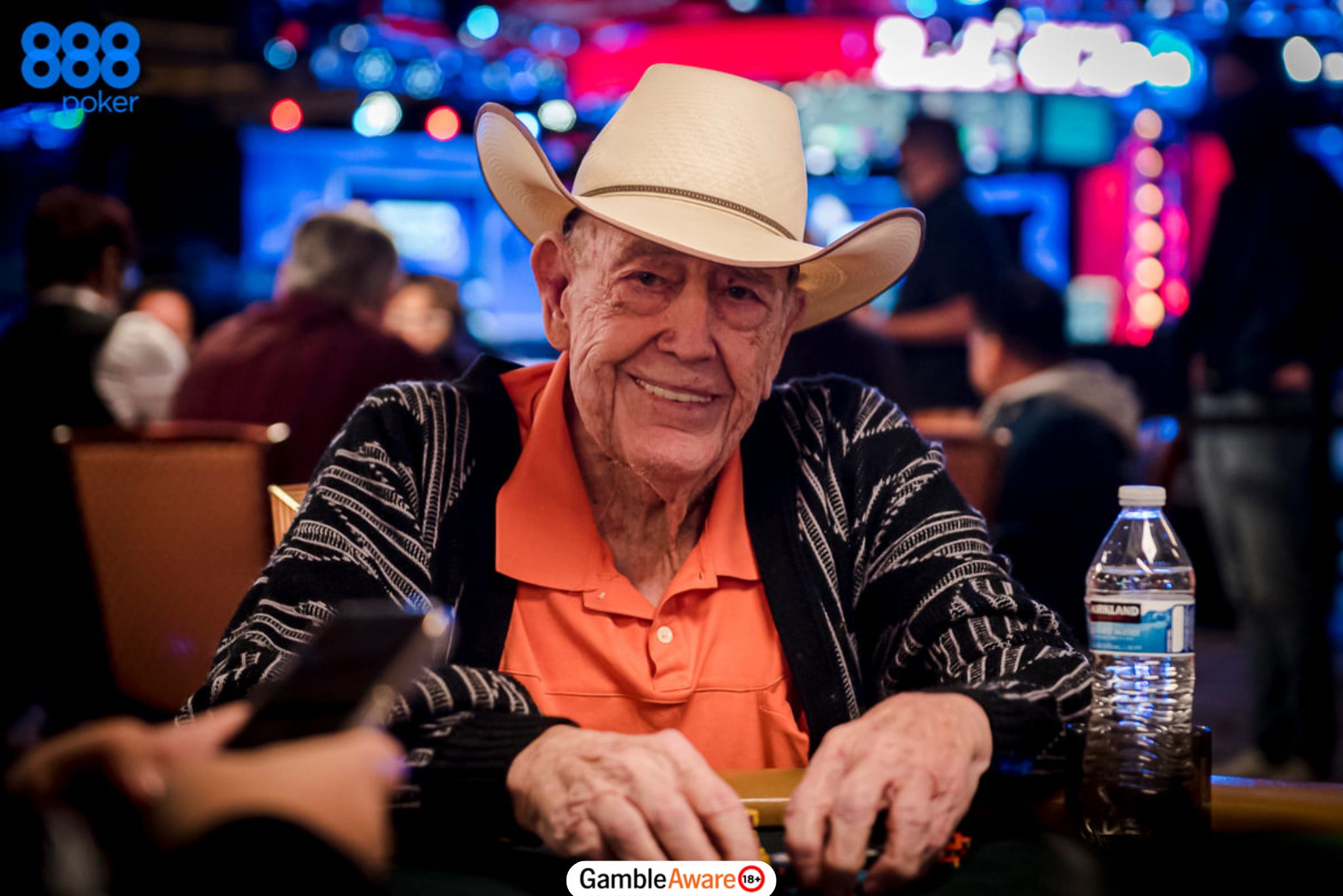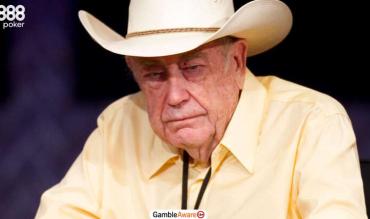Doyle "Texas Dolly" Brunson is often called the "Godfather of Poker".
At the height of his career, Doyle's net worth was estimated to be an incredible $75 million,
making him one of the wealthiest and most successful poker players in history.
Let’s jump into his story.
Road Gambler – The Origins
Doyle Brunson didn’t build his immense fortune under the bright lights of modern Las Vegas, but rather on the dangerous, illegal poker circuit of the post-war American Southwest.
Brunson was a road gambler, a professional who travelled from town to town seeking out high-stakes, cash-only games in backrooms and private residences. This world was devoid of security, where carrying a huge bankroll made him a constant target for robbers and cheats.
Disputes were settled not by rules but with intimidation, and the threat of arrest was ever-present. In those days, a Texas Hold’em game could result in a real-life hold-up!
In his autobiography The Godfather of Poker: The Doyle Brunson Story, Brunson recounts witnessing a fatal shooting over a card game in Fort Worth.
Rather than call the police, the players fled the scene to avoid any involvement or questioning.
Rise of the WSOP: Two-Time World Champion
The poker world began to change. In 1970, the World Series of Poker started in Las Vegas. This setup created a safe, legal, and high-profile environment for the greatest players to compete.
Brunson dominated the early WSOP. His back-to-back Main Event world championships in 1976 and 1977 solidified his reputation as one of the world’s best poker players of all time.
However, the fields were minuscule by today's standards.
- In 1976, there were only 22 entrants.
- And in 1977, the field grew to 34.
The winner-takes-all first-place prizes were $220,000 and $340,000, respectively.
In a highly improbable turn of events, Doyle won both events, holding T2 and catching a runner-runner full house in both to win the final hand. For this reason, the "Doyle Brunson" is the universal poker term for T2 and was Doyle's self-professed favourite hand.
In later games, Doyle would frequently show his T2 when winning a pot before smiling and saying, “always wins!”
Doyle’s Cash Game Earnings
While Doyle's tournament victories brought him fame, he derived most of his peak $75 million net worth through high-stakes cash games.
Unlike tournament winnings, which are publicly recorded, cash game results are private, making an exact calculation impossible.
However, it is widely understood and accepted within the poker world that his tournament earnings of just over $6 million represent a tiny fraction of his lifetime winnings.
The consistent, decades-long profits from legendary private games, like the "Big Game" at the Bellagio, are the true foundation of his fortune.
If you called Texas Dolly’s poker bluff, you could conservatively say that his cash game earnings account for well over 90% of his peak net worth.

Doyle’s Room and the $235 Million Bad Beat
At the height of the online poker boom in 2004, Doyle launched his own online poker site, "Doyle's Room". It quickly became a popular destination, offering players the chance to compete against him and other sponsored professionals.
Before the U.S. government's crackdown on online poker, Brunson received a colossal offer to sell the site. He later stated in a tweet that he turned down an offer of $235 million, believing the site's value would continue to grow.
"The week before the bill passed that killed online poker, I turned down 235 million dollars for Doyle’s Room. Oops."
The 2006 UIGEA legislation and the 2011 "Black Friday" indictments against major poker sites decimated the U.S. market, rendering Doyle’s Room nearly worthless. Brunson ultimately severed ties with the site in 2011, and Americas Cardroom later acquired IT.
While Doyle's Room contributed to Brunson’s earnings for several years, it is primarily a story of a missed nine-figure payday.
Doyle’s peak net worth might have been closer to $300 million if he had decided to sell Doyle’s Room sooner.
Doyle’s $100 SUPER/SYSTEM
In 1979, long before GTO poker, Doyle self-published a book entitled $100 SUPER/SYSTEM: A COURSE IN POWER POKER.
Its primary content focused on explaining an aggressive style of No-Limit Texas Hold 'em. This strategy differed significantly from the more conservative approaches commonly discussed at the time.
The book also featured chapters on different poker variants written by other top pros, including the following:
- Chip Reese (Seven-Card Stud)
- Bobby Baldwin (Limit Hold'em)
- David Sklansky (Seven-Card Stud Hi-Lo)
It was one of the first widely available books to treat poker as a game of complex strategy.
While exact lifetime sales figures are not publicly disclosed, Brunson priced the original book at an unprecedented $100 (equivalent to over $400 in today's money), targeting serious players and ensuring high margins.
He stated in multiple interviews that the book was a significant source of his wealth, with estimates on his earnings from Super/System and its sequel ranging from $4 million to over $10 million throughout his lifetime.
With those numbers, Super/System is one of the most financially successful poker books ever written!
Doyle’s Prolific Prop Bets
High-stakes prop bets dictated a significant portion of Doyle Brunson's financial life.
The subjects of these bets ranged from weight loss challenges to legendary golf matches where he reportedly won and lost seven-figure sums against other gamblers.
Almost any debatable outcome was an opportunity for a high-stakes gamble, reflecting a lifestyle where immense sums of money were constantly at risk.
Net worths were constantly fluctuating on the turn of a card in a poker hand.
RIP Doyle
Doyle Brunson's estimated peak net worth of $75 million was a testament to a life lived at the highest stakes, built primarily on decades of dominance in private, high-stakes cash games.
Doyle Brunson passed away on May 14, 2023, in Las Vegas, Nevada, at the age of 89, leaving behind a monumental legacy as the original "Godfather of Poker."
His estimated net worth at the time of his death was between $25 million and $40 million.


